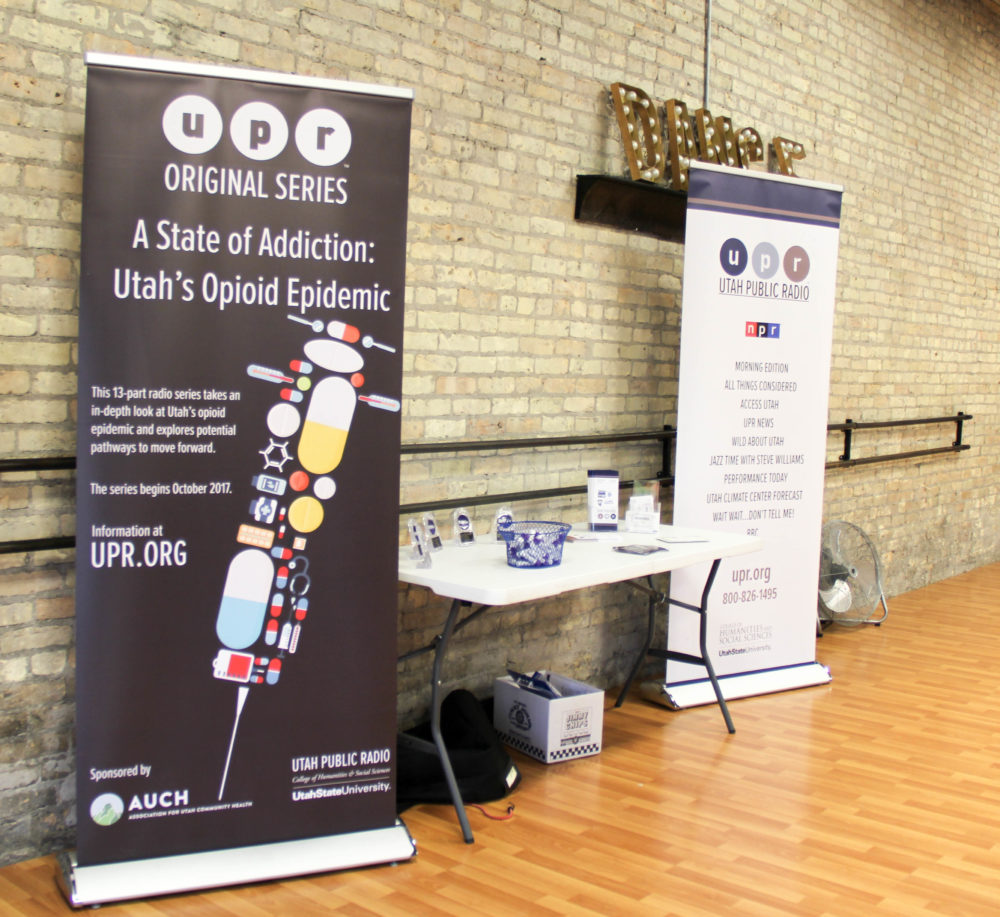‘Opidemic’ update: Opioids are killers, but we are all solutions, panel says
“People don’t plan to start heroin,” Dr. Eric Barker said matter-of-factly, posed against a backdrop of bright pink sparkles and floor-to-ceiling mirrors. Sitting in the middle of a five-person panel Friday night at Starstoppers Dance Studio in Logan, Barker drove home the idea that Opioids are an epidemic and should be dealt with accordingly.
“People start taking opioids because of a knee surgery,” Barker continued. “They may be vulnerable to addiction and falling deeper due to genetic reasons, or other factors.”
Joined by Utah Public Radio journalist Kristen Munson, Jorden Saxton Hackney, outreach coordinator for Dying in Vein, and Utah State University Psychology professor Amy Odum, Barker and the Opioid Crisis Panel at the Block Film and Art Fest attempted to bring clarity to an epidemic that has claimed more than 60,000 lives in the United States over the past year.
 Erica McNeill
Erica McNeill “In Utah, we have a culture where abusing prescription drugs has been happening for a very long time, but no one really talks about it,” Odum said. “If we don’t start talking about it, the problem is going to get a lot worse far before it ever gets better.”
In fact, according to the Utah Health Department, drug overdoses kill an average of six Utahns every day — and Utah has the seventh-highest overdose rate in the U.S. despite being only the 31st most populated state.
Preventing more Utahns from dying of opioid overdose begins with dialogue, panelists said.
“Talking makes a difference,” Barker said. “We need to prevent opioids being prescribed at the rate they are, but not one doctor can change the culture. Community engagement and understanding is the only thing that will change drug addictions.”
Panelists agreed that the demonization of opioid addicts only leads to more addictions.
“We don’t blame people for getting brain cancer,” Barker said.
Odum agreed, adding that, “If we really care about saving lives, we need to provide resources for addicts.”
Odum praised the actions of Portugal, where most drugs were decriminalized in 2001 and treated as public health issues rather than crimes. Because of these actions, Odum said the country has seen a 95 percent decrease in drug overdose deaths in the past 15 years.
“If we ignore these facts it can be detrimental to our society,” Odum said. “We are trying to control our psychology, as if life isn’t supposed to have pain. Life does have loss and discomfort. We all experience pain, but suffering is something we can avoid.”
Opioid addiction usually begins with prescribed pills, the panel said. In fact, the Utah Health Department reported that 80 percent of addictions begin with prescriptions.
“This dependency can quickly translate to heroin use,” Odum said. “It seems far-fetched, but heroin is cheaper than pills, more readily accessible and much more powerful.”
Barker cited a not-yet-released New York University study that concluded opioids aren’t effective in managing chronic pain.
 Erica McNeill
Erica McNeill “There is a place for opioids in medicine. Not for chronic pain, but usually in end-of-life situations opioids can make suffering much more manageable for a patient,” Barker said.
The panel agreed, saying there needs to be a way to manage chronic pain and suffering, while also preventing addiction. Odum and Munson both mentioned cannabis as a possible alternative to opioids.
“Dangers of cannabis are much lower than opioids and even alcohol,” Munson said. “Plenty of people die from overdose or alcohol poisoning, but there has never been someone to die purely from using cannabis.”
Odum said cannabis is understudied due to its Schedule I classification at the federal level.
“It’s not easy to study [cannabis’] effects on the brain,” Odum said. “There’s been studies of cannabinoids such as cannabidiol (CBD) that show a very positive outlook for managing pain and epilepsy.”
A 2013 study at Harvard University concluded that cannabinoids have the capability of treating psychosis.
 Erica McNeill
Erica McNeill “Though no one is sure the future of cannabis in society yet, I would predict it will be legal at the federal level soon, and then there can be better studies,” Barker said.
For those already addicted to opioids, Munson said there are already many helpful remedies, such as Vivitrol, Methadone and Naloxone.
“Naloxone has the potential to save lives. If someone knows anyone with a bad addiction, Naloxone can save their life from an overdose,” Munson said.
 Erica McNeill
Erica McNeill Over 2.6 million prescriptions were signed in 2015 for opioids in Utah. This means opioids are dispensed at a rate of almost one prescription for every resident.
UPR has teamed up with Intermountain Healthcare and the makers of the documentary Dying in Vein in effort to prevent deaths through awareness — and hopefully affect positive change in Utah and throughout the country.
— carter.moore@aggiemail.usu.edu
@carterthegrreat
(This story has been edited to remove a reference to an American Epilepsy Society study. The AES’s position on medical marijuana can be found here.)
 Sydney Oliver
Sydney Oliver Jenny Mackenzie’s documentary, Dying in Vein, was shown at The Block Film and Art Fest in Logan on Oct. 6 and 7. It screens next at Peery’s Egyptian Theater in Ogden on Wednesday.


Good stuff bud
Sweet stuff